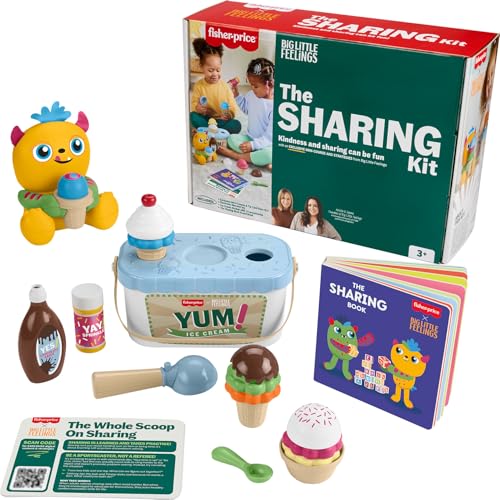To teach your toddler to share without meltdowns, model sharing and good listening daily. Encourage polite requests and offer your own toys first to set an example. Stay calm during conflicts and guide your child to express feelings with words like “Can I have a turn?” Reinforce patience and boundaries, praising small successes to build confidence. Consistent, gentle guidance helps your little one develop respectful, cooperative play skills—all essential for smooth playdates. Keep exploring for more helpful strategies.
Key Takeaways
- Teach toddlers simple sharing phrases like “Can I play with that?” to encourage polite requesting.
- Model sharing and respectful behavior daily to set a positive example for your child.
- Use positive reinforcement and praise when your child shares or resolves conflicts calmly.
- Prepare your child beforehand about respecting others’ toys and feelings during playdates.
- Stay calm during conflicts, guiding children to express feelings and take turns without meltdowns.

When your child is invited to a playdate, knowing proper etiquette guarantees everyone has a fun and respectful experience. One of the key skills to teach your toddler is sharing, which can be challenging at this age. To help, develop simple sharing strategies that make it easier for your child to take turns and understand the value of sharing. For instance, suggest that they ask politely if they can play with a toy or offer to share their own toys first. Reinforce that sharing is about kindness and cooperation, not just giving up something. Use positive language and praise your child when they show sharing behaviors, which encourages them to continue.
Conflicts may arise during playdates, but how you handle them can teach your child important conflict resolution skills. When disagreements happen, stay calm and guide your child to express their feelings calmly. Encourage them to use words like “I feel upset” or “Can I have a turn?” instead of hitting or grabbing. Show your child how to listen to the other child’s perspective and find a solution together. For example, if two children want the same toy, suggest they take turns or play with different toys nearby. This approach teaches your child that conflicts are natural but can be resolved peacefully through communication and compromise.
Teaching children to express feelings and negotiate peacefully promotes respectful playdates and healthy social skills.
It’s also essential to set clear boundaries beforehand. Explain to your child that respecting others’ belongings and feelings is part of good playdate etiquette. Remind them that sometimes, patience and waiting for their turn are necessary, and that everyone deserves respect. If your child struggles with sharing or conflict resolution, role-playing can help. Practice scenarios where they share or resolve disagreements, so they’re better prepared during actual playdates.
Remember, modeling good behavior is one of the most effective ways to teach your child. Show them how you share, listen, and resolve conflicts calmly in your daily interactions. When your child sees you handle disagreements with patience and empathy, they’re more likely to imitate those behaviors.
Finally, keep a positive attitude and be patient. Learning to share and resolve conflicts takes time, especially for toddlers. Celebrate small successes and offer gentle reminders when things don’t go perfectly. With consistent guidance, your child will develop the social skills needed to enjoy playdates with kindness, cooperation, and respect. This positive reinforcement is especially effective in encouraging ongoing good behavior and helping your child build confidence in their social interactions.

Fisher-Price Toddler Toys Big Little Feelings Sharing Kit, 18-Piece Set of Activities & Parenting Tips for Preschool Kids Ages 3 Years
Fisher-Price has teamed up with Big Little Feelings to create this specially designed playkit to help make sharing…
As an affiliate, we earn on qualifying purchases.
As an affiliate, we earn on qualifying purchases.
Frequently Asked Questions
How Can I Encourage My Toddler to Share Willingly?
To encourage your toddler to share willingly, try using sharing tips that promote cooperation. Set clear expectations and model sharing behaviors yourself. Praise small efforts and offer gentle reminders about taking turns. Make sharing fun by turning it into a game or story. Stay patient and consistent, and avoid forcing; instead, gently guide them towards understanding the joy of sharing, which helps foster cooperation naturally over time.
What Are Signs My Toddler Is Overwhelmed During a Playdate?
During a playdate, you might notice your toddler showing signs of being overwhelmed, like fussiness, avoiding eye contact, or clinging to you. Pay attention to your playdate preparation, ensuring activities are age-appropriate and not overstimulating. Watching for toddler emotional cues helps you step in early, offering comfort or a calming break, so the experience remains positive and your child feels secure and understood throughout the visit.
How Do I Handle Conflicts Between Toddlers During Playdates?
Conflicts between toddlers can feel overwhelming, but they’re natural. You handle these moments with patience and clear sharing strategies, encouraging kids to express feelings and negotiate. Use conflict resolution techniques like guiding them to take turns or share toys, emphasizing cooperation over competition. Remember, your calm approach models respectful behavior, helping toddlers learn essential social skills. With consistent guidance, they’ll develop better ways to navigate disagreements and enjoy their playdates.
When Should I Intervene in My Child’s Sharing Disputes?
When your child’s sharing disputes arise, you should step in if they cross sharing boundaries or escalate into sibling rivalry. Watch for signs of frustration or tears, and gently remind them about taking turns and respecting each other’s feelings. Your role is to guide rather than control, helping them learn healthy sharing habits. Intervening at the right moment fosters understanding and reduces conflicts, making playdates more enjoyable for everyone.
How Can I Teach Sharing Without Making My Child Feel Forced?
Did you know that children develop sharing skills at different rates? To teach sharing without making your child feel forced, use gentle encouragement and set boundaries kindly. You can model sharing behaviors yourself, praise your child’s efforts, and create opportunities for them to share voluntarily. Avoid pressure, and instead, foster a positive environment where sharing feels natural. This approach helps your child learn cooperation while respecting their feelings.

Junior Learning 6 Conflict & Resolution Games
Games include: Are You a Bully? Sharks, Jellyfish, Turtles, Compromise Burgers, Persuasion Pot, Keep Calm Meter, A Spinning…
As an affiliate, we earn on qualifying purchases.
As an affiliate, we earn on qualifying purchases.
Conclusion
Remember, teaching your toddler to share during playdates builds their social skills and confidence. For example, if your child hesitates to share a toy, gently encourage them by suggesting taking turns, making it fun. Over time, they’ll learn patience and kindness, reducing tantrums. Keep modeling polite sharing behaviors yourself, and stay patient as your little one navigates these new social skills. With consistent guidance, your toddler will develop positive playdate habits that last a lifetime.

Lajeje Toddler Tea Party Set for Girls Ages 3-5, 23-Piece Pretend Play Tea Set for Kids with Teapot, Cups, Plates & Desserts, Perfect Size for Little Hands, Birthday for Girls
Complete 23-Piece Tea Set for Kids:Includes teapot, cups, plates, spoons & desserts—everything toddlers need for fun pretend tea…
As an affiliate, we earn on qualifying purchases.
As an affiliate, we earn on qualifying purchases.

hand2mind See My Feelings Mirror, Play Therapy Toys, Mindfulness for Kids, Emotional Regulation for Kids, Social Emotional Learning Activities, Calm Down Corner Supplies, Calming Corner (Set of 1)
EMOTIONS FOR TODDLERS: Help children learn to label and identify emotions with the See My Feelings Mirror! Make…
As an affiliate, we earn on qualifying purchases.
As an affiliate, we earn on qualifying purchases.









